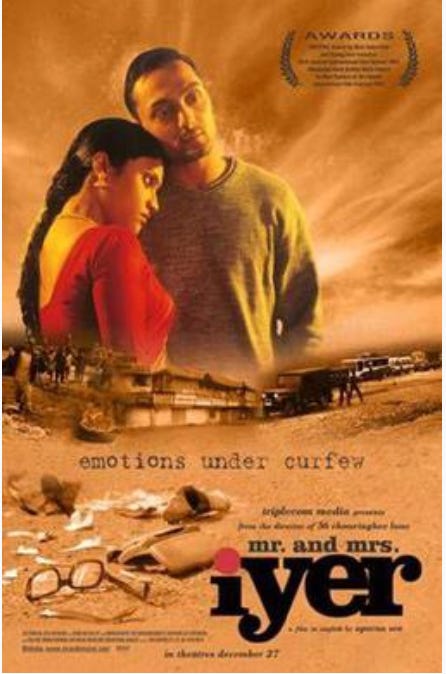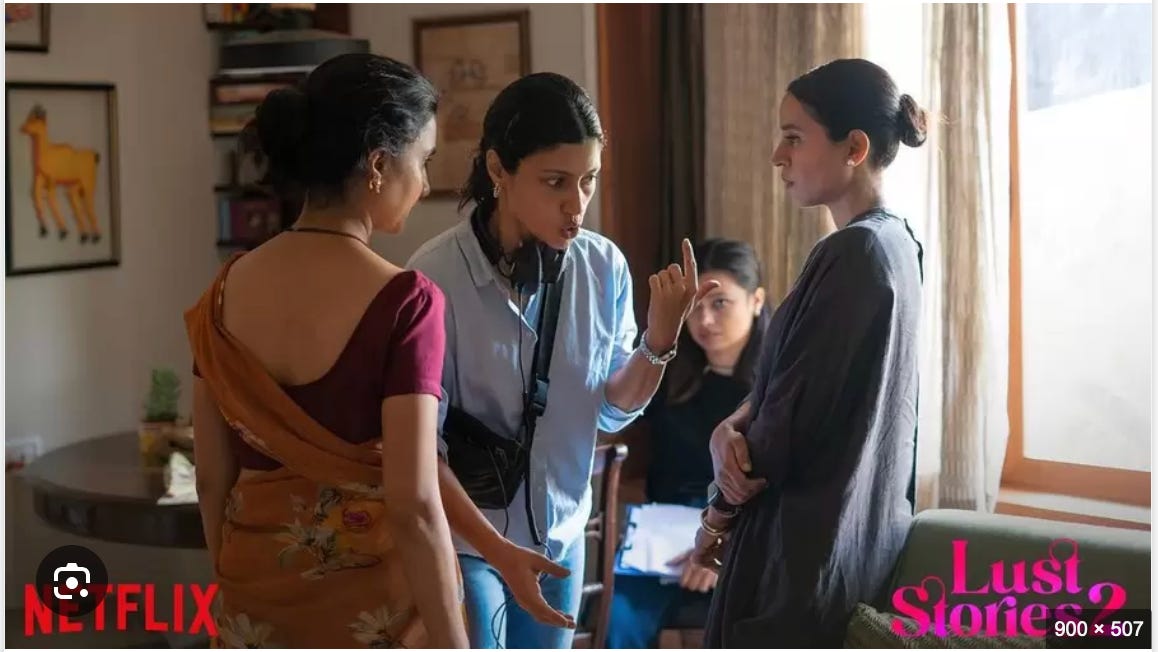In the past few years, several people who enjoy some forms of celebrity have made claims of being feminists. While some are spot on, others fall in the category of choice feminism, which is women making choices and being celebrated as feminists, despite that choice pandering to patriarchy. Others espouse feminist values while behaving exactly in opposite ways. Some, like Mahua Moitra, have downright rejected feminism, unfortunately as her politics can largely be termed feminist given what she fights for- justice and equality for all. In fact, what came to her defense when she was disqualified from her role as Member of Parliament last term were arguments made by the women’s movements over the years.
While watching Zakir Khan interviewing Konkona Sen Sharma and Manoj Bajpayee while they were promoting their series, Killer Soup, I noticed the many feminist ways of Sen Sharma. This observation made me think of the multiple occasions where she has not let me down, but only raised my expectations of what a celebrity of her stature can do. I will recount some ways in this post and maybe, we will be able to differentiate between a more nuanced form of feminism from what we are served otherwise by others. This by no means is a post on Indian cinema and feminism as there are better and more detailed pieces on that for sure. This is also not a post on others who have endorsed feminism in the past or present, as that list is long too. We can see, for example, what is happening with the WCC in Malayalam Cinema. This post is only looking at Sen Sharma as an example and slicing and dicing what she has said, frankly not so much as critique but a study. Keeping in mind the long long posts that I write, I thought maybe, a list will be more beneficial. So here goes.
(i) On Vidya Balan: Sen Sharma debuted (as an adult actor) in Mr and Mrs Iyer, where she played a Tamil young mother, travelling with her infant son Santanam and meets Raja, a co-traveller played by Rahul Bose. It is a communally charged time, and the bus is hijacked by terrorists who are looking to kill Muslims and Sen Sharma saves Raja by lying that he is Mr Iyer, her husband. The terrorists leave. Through the entire journey, Sen Sharma and Bose, fall in love perhaps, a kind of forbidden love because she is already married and he is a Muslim. At the same time, Vidya Balan had debuted in Parineeta, which was a superhit and catapulted her to fame. At that time, I remember The Indian Express had carried an article on what the two actresses had to say about each other as both of them were playing women from the other’s community- Balan is Keralite (South Indian, for non-South Indians) and played a Bengali while Sen Sharma is Bengali playing a Tamil person. Both of them had wonderful things to say about each other’s’ portrayals and that’s when, Sen Sharma really caught my eye. She has been my favourite celebrity ever since. I think the other thing that I was awestruck by was the topic of the movie. The movie gave me chills in the way it depicted communal violence and for Sen Sharma to choose that as her first movie shows some amount of courage. I mean, the right-wing might be new for me but definitely not for her or her mother who was the director of the movie.
Her choice of movies is also commendable. When she played the role of a woman experiencing marital rape in Lipstick Under My Burkha, she was acting in a movie after a long time. In an interview with Anupama Chopra, she mentioned that she simply waits for movies with meaningful scripts and characters to come her way. She came across as someone who wouldn’t lend her name to a project, she didn’t believe in. She wouldn’t espouse feminist values and simultaneously play roles that denigrate women a point I come to repeatedly in this article. She played Bharti Mandal in the short movie Ajeeb Dastans, brave as usual- both in how she looked with very minimal make-up and what she was trying to convey (a Dalit-queer person in love with someone from the upper-caste).
(ii) Do you cook? I watched Konkona Sen Sharma’s and Manoj Bajpayee’s interview with Zakir Khan, simply because I had seen on Instagram that Sen Sharma was beautifully styled for an event. I later found out that the event was this interview. I wanted to watch the interview because I was interested in Sen Sharma’s dress. That interview actually convinced me that who I was looking at and who I had admired, had not failed me. If I had to be her celebrity feminist coach (a job, I am willing to have, if you give it me) I would have prepared her exactly the way her own years of being a feminist in an inherently misogynistic industry had prepared her. When Zakir Khan was struggling to pronounce her name, she took the time to correct him (here you can see Bajpayee knew that her name gets mispronounced often and was compassionate and ready). As the interview progresses, Khan asks them if they cook. Sen Sharma strategically shifts the spotlight on Bajpayee who is already having most of it and then turns the question to Khan himself (Bajpayee says he is a good cook while Khan says, characteristically, that he is a good eater). You can tell, she has heard this question before- whether asked of others or of herself. And she came prepared. There are other things you can notice in that interview, she always takes full names of the people who work with her, evident even in her Instagram posts. She is all for giving full credit. She knew Bajpayee’s entire filmography, if you notice. I mean, there is so much feminism in that, and also not really right. It’s just basic professional decency. She is simply attentive.
(iii) Women’s sexuality: Sen Sharma’s movies have referenced gender and sexuality in even tiny ways. In Lust Stories 2, Sen Sharma directed The Mirror, which chronicles the lives of Ishita (played by Tillotama Shome) and Seema (played by Amruta Subhash), who are now entangled in a difficult circumstance as Ishita turns into a voyeur and Seema who enjoys being looked at while she is having sex with her husband in Ishita’s house, where she works. If you compare Sen Sharma’s short movie with others in the same anthology, you will notice how original, and path-breaking her movie is. One of the short stories in that movie exhorts young people to have pre-marital sex in order to find out sexual compatibility with a potential monogamous partner. The other one shows the life of a male philanderer who meets his ex-lover who is a ghost and the last one is a story of a woman in an abusive marriage who, in her desperate attempts of getting out, risks the only hope of her life. All of these had old regurgitated tropes of cheating men, (mis)use of power and stature, the subordination of women, a progressive older parent figure, and a revengeful ghost. We have heard and seen all of these before. But not what Sen Sharma had to offer. She pushes the envelope on conversations around agency, forbidden pleasure and even the relationships between women that includes a level of trust and forgiveness. This level of depth and nuance in recent times is rare.
(iv) You forgot me! Finally, when the anti-CAA-NRC protests had reached a crescendo, a twitter account had made a list of all actors and celebrities who had taken a stand against the act. The idea was to create a ready reference for right wing people to boycott these artists. Sen Sharma’s name was missing to which she sassily tweeted to them to include her. It’s not easy to be a woman who anyway has limited roles on offer to willingly take a stand that has material repercussions. Her interview with Smitha Prakash of ANI, where she speaks of Animal, exemplifies her anti-misogynistic stand. She played a woman who faced intimate partner violence in Lipstick Under my Burkha, a sister who witnesses her older sister’s broken marriage in Life in a Metro and the inferior place that is accorded to women in the film industry in Luck by Chance, there is a congruence in the roles she plays and what she says.
Surely, there are many more Sen Sharma movies, interviews and what not, that might not be considered feminist. At some point, she might fall short. But in a society where anything goes as feminism, I see Sen Sharma repeatedly showing us the way. It’s always a treat when she is around.







How I love Konkona and everything she does…in her movies and otherwise!
Really enjoyed reading this :)